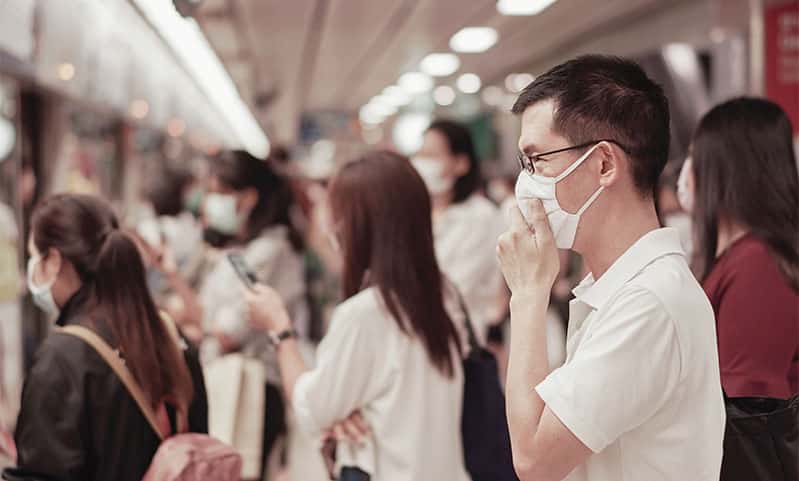As the Coronavirus (COVID-19) outbreak spreads, people who have jobs are worried about contracting the virus at work or during their commutes.
Generally, if employees cite coronavirus concerns and refuse to come to work, employers can legally terminate them.
Working from home is not a fundamental right even under the Americans with Disabilities Act.
However, the United States has a number of workplace safety laws.
Additionally, in terms of coronavirus fears, “employers [are] preemptively going well beyond what OSHA would ever require,” according to one labor lawyer.
As of early March, there have been 128 confirmed cases and nine confirmed coronavirus deaths in the United States.
Your Rights When You Get Sick at Work
In a nutshell, you have the right to a safe and secure place to work. When it comes to contagious disease outbreaks, these maxims include a lot of grey area.
However, during the 2009 H1N1 swine flu outbreak, many agencies, including the Occupational Safety and Health Administration, significantly updated their rules.
Workers’ compensation covers many occupational diseases, such as hearing loss and repetitive stress disorder.
These benefits usually include wage replacement and medical bill payment.
Typically, job injury victims receive two-thirds of their average weekly wage until they can go back to work.
In more serious cases, such as a coronavirus death, alternative wage replacement is usually available.
Medical bill payment usually includes all reasonably necessary medical expenses, from the first day of emergency care to the last day of physical therapy.
Viral illnesses usually involve proof issues. Injured victims need not establish fault.
However, they must prove that they got sick at work, and not on the way to or from work.
This burden is difficult to meet, unless a significant number of your co-workers contracted the same illness.
The aforementioned OSHA workplace safety rules require every employer to “provide a workplace free of known health and safety hazards.”
Specifics include the right to:
- Access “required safety gear,”
- Report a work-related illness or injury,
- View workplace illness/injury logs, and
- Obtain copies of tests which detected known safety or health hazards, and
- Ask OSHA to inspect the premises.
Workers must be able to exercise these rights without any fear of retaliation.
In other words, employers cannot take adverse action against their workers and cannot even threaten to take such action.
Right now, and for the foreseeable future, these rights might or might not apply to COVID-19 concerns.
If the outbreak worsens and the mayor or another public official declares a state of emergency, things could change.
Emergency responders, such as firefighters and hospital workers, are usually entitled to additional protections.
Your Rights When You Get Injured Anywhere
Coronavirus exposure is a limited risk, but injury risks are everywhere. Car crashes are a good example.
Every year, these incidents kill or seriously injure millions of Americans.
Other common injuries include unintentional poisoning (mostly drug overdoses), dog bites, environmental poisoning, and fall injuries.
All these victims have the right to medical treatment.
That’s usually true even if they have no insurance or money.
Generally, a New York personal injury attorney connects victims with doctors who charge nothing upfront for their services.
Since these physicians concentrate on accident-related injuries, they know how to diagnose and treat such wounds.
For example, many car crash victims and other victims sustain head injuries. These wounds are difficult to diagnose.
Since the brain often conceals its own injuries, many of these victims tell their doctors they “feel fine.”
Additionally, many head injury symptoms mimic other conditions, such as shock from the accident. Experienced car crash doctors, on the other hand, know what to look for.
FAIR COMPENSATION
Accident victims also have the right to fair compensation. In a serious injury case, that compensation usually includes money for:
- Economic losses, such as medical bills and lost wages, and
- Noneconomic losses, such as pain and suffering and emotional distress.
To obtain this compensation, New York personal injury attorneys must usually establish negligence, or a lack of ordinary care.
Other legal theories include negligence per se, which is the violation of a safety law, and strict liability, which often applies in defective drug cases.
Finally, and perhaps most importantly, accident victims have the right to justice.
Fundamentally, injury lawsuits are not about “blaming” anyone for what happened.
After all, we all make mistakes.
And, we must all pay the consequences of our mistakes.
That’s the essence of an injury claim.
This justice is especially important when a large company was directly or indirectly responsible for the accident.
Unless hospitals and other negligent business change their operating procedures, more victims will probably experience the same fate you did.
Legal action keeps that from happening.
Wherever you go and whatever you do, you have rights. For a free consultation with an experienced personal injury attorney in New York, contact Napoli Shkolnik PLLC. We handle injury cases on a nationwide basis.
